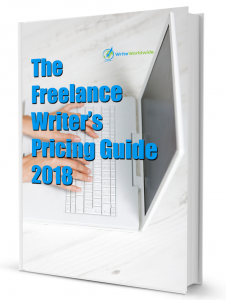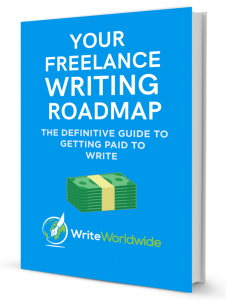“English isn’t my first language. English isn’t even my second or third language. So, I had to make extra effort to deliver high-quality articles.” – Victoria Rudi
Today we interview Victoria Rudi, who quit her day job to work for herself as a content creator and content strategist. Victoria helps startups and businesses – that create products for the event industry – grow their business.
Let’s get straight into the interview.
Hi Victoria, please introduce yourself to the WriteWorldwide readers.
I’m Victoria, and I’m both a content creator and content strategist. I work with startups and businesses that focus on creating digital tools (apps or software) for event professionals.
I write about event planning, event marketing, brand events, brand experience, brand advocacy, content marketing and strategy. I hold a Master’s Degree in Event Management from University of Deusto, Spain, and I have more than five years experience as an event professional.
Thanks to the companies I work with, I’m able to better understand how marketing and brand advocacy works. This background gives me enough expertise and confidence to write on the subjects mentioned above.
Why did you choose to become a writer?
I don’t consider myself a writer yet. I’ll be one when I have enough resources to dedicate myself to literature. I prefer to call myself a content creator since the work I do helps different startups and businesses raise brand awareness, attract new leads, position themselves as thought leaders, and sell products.
Why did I choose to become a content creator? I wanted to break free from my 9 to 5 job and focus on my own projects. I also wanted to see if could make money doing what I love.
How did you break into freelance writing and have you experienced much success yet?
I just sat and worked. It was challenging at the beginning because I didn’t know how to communicate with potential clients. Plus, I was uncertain about my abilities, and I didn’t know how important it was to have an editor.
English isn’t my first language. English isn’t even my second or third language. So, I had to make extra effort to deliver high-quality articles.
As for success, I can’t buy a Ferrari yet. But, I work with different clients, I have plenty to do, and I’m confident that I’ll grow the business without having to return to a 9-5 job.
What are some of the biggest challenges you’ve faced and how did you overcome them?
My biggest challenge was psychological. I was afraid I wouldn’t be able to deliver a high-quality product to clients. Although I had the knowledge and the ability to transmit it via words, I experienced impostor syndrome. Who am I to approach businesses or startups and offer them my content-related services?
However, when I saw the results of my work – new leads for my clients, congratulatory emails and new writing assignments – I realised I had lots to offer.
What’s the one piece of advice you wish someone had given you at the start of your career?
Whether you are a native or not, always work with an editor to make sure your articles are well written. I consider myself incredibly lucky to work with Anita Smith. Her edits skyrocketed the quality of my writing.
She’s very careful with preserving the voice of the author. Working with her, helped me improve my writing, and deliver high-quality work to my clients.
I know that many people avoid working with editors due to the cost. However, by doing so, you risk delivering poor quality work to your clients, and it’ll show. You’re a professional, aren’t you?
What techniques do you use to grow your writing business?
I have one method: I try to produce high-quality content and find ways to add real value to my clients’ businesses. I can’t grow without helping others grow.
What’s the most effective method you’ve used to find new clients?
Cold pitching. Apart from that, I often get work thanks to client referrals. If I didn’t have any clients right now, I would send 300 emails per week to guarantee a reasonable quantity of work.
What does your daily writing routine look like?
I’m still struggling to build a routine. Another challenge when working for yourself is finding work-life balance. And, because you don’t have to wake up at a certain hour and go work, it does require discipline and focus.
My goal is to build a healthy routine so that I can work reasonable hours and rest when I need to. The thing I discovered recently is that rest and recovery are the most important components of an entrepreneur’s or freelancer’s life.
Who are your biggest influences and people you admire in the freelance writing industry?
One name: Bamidele Onibalusi. Without his help, I wouldn’t be where I am now. I’m truly grateful for his unconditional help and support.
Name one book, one tool, and one article that have helped you in your writing career.
Content Inc by Joe Pulizzi helped me understand why freelance writing isn’t what others call a “passion” or “romantic endeavour”. It’s a business, and you are responsible for delivering quality work and helping clients grow their business.
CoSchedule is a great tool for brainstorming different article headlines.
As for articles, Ramit Sethi’s eBook The Ultimate Guide to Remarkable Content, helped improve the quality of my writing tenfold.
What would you say to writers who are struggling to pick a niche?
Pick one and devote yourself to it. What do you know best? What’s your area of expertise? What are the things you love to read and watch? Start with something narrow and expand from there.
How do you keep your writing skills sharp?
Whenever I start writing an article, I ask myself what the purpose of the article is. What will readers learn from reading it? Is the information I’m writing down going to help them? This helps me stay on point when I’m writing.
What advice would you give other aspiring freelance writers who want to make money, freelance writing?
Keep a notebook by your side. When you see something interesting (an article, a Facebook post, an image etc.) write it down. Then ask yourself: What could I write about this topic? How could I apply it to my niche?
Sometimes, a silly article about Panda bears can help you come up with a remarkable idea for a marketing-related article. Try making associations; magic things will happen.
Finally, get an editor!
What limiting beliefs must ESL writers get rid of to achieve success?
Get rid of the notion that native speakers are better writers. It isn’t true. In fact, some native speakers don’t write well, and their articles have lots of grammar errors.
What are your future plans?
To find a better life-work balance.




Thanks a lot for this. It has come at a time when am struggling to start my freelance writing career.
My biggest challenge has been believing in myself and in my abilities. Every time I want to take a step forward, I give myself a reason not to.
But am now inspired by this article and am going for it!
Thanks Nick!
Hi Ann,
Those doubts can be crippling. But, what I can suggest is that you take one small step at a time. They don’t have to be giant leaps. Over time those little steps add up. If you have any problems or questions, feel free to email the WriteWorldwide team.
All the best,
Nick
thanks so much victoria,am enrighted by your courage on online jobs/contents.am a new freelancer i had some challenges but am encourage now i think i can push harder
regards
FRIDAH